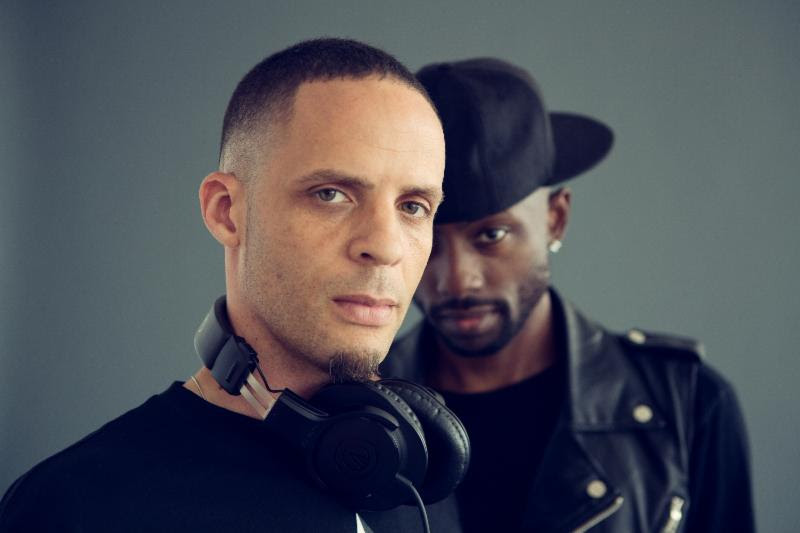Saxophonist Ivo Perelman Revisits
Classical Techniques After Extensive Traveling
in His Native Brazil on Five New Releases
Corpo, Soul, Blue, The Hitchhiker and Breaking Point -
Available May 20 on Leo Records
"A modern day saxophone colossus" (Echoes); "The finest improvisational genius of our time" (Bop-N-Jazz); "one of the great saxophone virtuosi and exponents of spontaneous composition to have emerged in the past three decades" (Jazzwise) - these represent just some of the accolades that pour in with each new set of releases by Ivo Perelman.
This extraordinary artist continues to map new territory for his chosen
instrument, the tenor saxophone. And by regularly releasing multiple
albums documenting his explorations, he provides listeners with multiple
avenues into his music.
But
the release of five albums at once (all available on Leo Records)
signifies a herculean effort even for Perelman. What's more, each of
these albums presents a different array of musical cohorts, a different
format, and a different concept. "Interestingly," Perelman notes, "this
grouping of albums will feature all of the musicians that I've been
collaborating with in the past several years"--a list that comprises
violist Mat Maneri, keyboardists Matthew Shipp and Karl Berger, bassists Michael Bisio and Joe Morris (who also plays acoustic guitar), and drummers Gerald Cleaver and Whit Dickey.
Three of these albums--the duo discs Corpo and Blue, and the quartet effort Soul--were
recorded in a two-week period; they exploit a major theoretical
breakthrough that Perelman experienced on an extended stay in Brazil,
the nation of his birth. In Autumn of 2015, he traveled to São Paolo to
oversee a major exhibition of his work in the visual arts. (Perelman
spends approximately half his time producing highly-sought drawings and
paintings.) He ended up staying nearly half a year, far removed from the
daily grind of his life in New York, and this hiatus "put my brain in a
different mode," he said upon his return. "I got away from the need to
'achieve' something. I relaxed."
|
|  |
Photo Credit: Michael David Adams
|  |
He
also began to revisit the serialist (12-tone) composers--Arnold
Schönberg, Alban Berg, Anton Webern--which led to an important
realization. The core tenet of serialism is that each note in the scale
exerts equal weight; from that, Perelman focused on the corollary that
each interval--the distance between any pitch and the one that
follows--should be treated with the same egalitarianism. "The
intervallic system has become my dogma now," he explains in the liner
notes to Corpo. "Every interval is of equal
importance...I don't have to be modal, or tonal, or atonal. All the
intervals, a third or a seventh or a fifth, these all have the same
importance for me now." This has led to new practice regimens and a
corresponding emancipation of Perelman's already fluid approach to
melody as well as timbre.
Corpo,
the first album recorded by Perelman upon his return to New York, stars
pianist Matthew Shipp, the saxophonist's longtime musical soul-mate. In
14 tracks of moderate length, the disc offers evidence of Perelman's
new "intervallic system," as well as a purified distillation of an
ever-evolving musical partnership that has been compared to
Brubeck/Desmond and Coltrane/Tyner. Says pianist Shipp, in his liner
essay for the album: "Corpo is the ultimate
coming together of everything Ivo and I have been working on for years. .
. . the apotheosis of the Perelman/Shipp duo cosmos. Our [previous
album] Callas was a breakthrough for us; Corpo is the ultimate flowering."
One week after Corpo, Perelman and Shipp returned to the studio; they were joined by bassist Michael Bisio and drummer Whit Dickey to record Soul, which, as its name suggests, constitutes a companion piece to Corpo
(the Portuguese word for "body"). More than simply "fleshing out" the
Perelman-Shipp duo, the added musicians - whose many sessions with
Perelman have given them intimate knowledge of how his music takes
shape, in the studio, and without pre-existing blueprints for the
improvisations - effortlessly integrate themselves into these
performances. "Bisio underscores the music with supple muscle, finding
valuable notes in between those that make up Shipp's chords," writes
liner annotator Neil Tesser, while "Dickey adds color and texture that
peer into the swirl of melodies and light them from within."
Then, one week after the Soul date, Perelman met with bassist/guitarist Joe Morris to record Blue.
The album marks the first time Perelman, despite all the shifting
contextual landscapes shaping his career, has ever recorded in a duo of
tenor sax and unamplified guitar. "With an instrument that has
resonance, where the notes have a long decay," Perelman explains,
"you're always being fed and nourished as the sound remains in mid-air.
But with acoustic guitar, the moment that Joe lifts his finger from the
string, the sound dies. You're all alone. So that was the challenge for
me, to play with something so soft-spoken." None of the tracks are
actual 12- or 16-bar blues compositions, of course, since nothing was
composed prior to what took place in the studio; rather, says the
musician/painter, "It has the feeling of the color blue," in all the
variations of that hue.
The Hitchhiker
marks another "first" for Perelman; it pairs him with Karl Berger on
vibraphone to mark the only time in the saxophonist's career that he has
recorded with that instrument. Perelman first worked with Berger - the
pioneering composer and arranger of new music (within and beyond jazz)
and co-founder, with Ornette Coleman, of the Creative Music Studio in
Woodstock, New York - on Reverie (2014), but on that project,
Berger played piano. The vibraphone has a reduced potential for the
thick chords available to a pianist, so in that sense, says Perelman,
"he's giving me a condensed scheme" of harmonic potentialities. A
possible pitfall? No; it only "made me focus more," says Perelman.
The final album in this release, The Breaking Point,
continues Perelman's highly successful partnership with violist Mat
Maneri, but this time in a quartet format; previous Perelman-Maneri
matchups had occurred only in duo or trio settings. "I had in my mind
what it would sound like in a more powerful setting, with drums," says
Perelman. With bassist Joe Morris and drummer Gerald Cleaver, the disc
constitutes yet one more rarity for Perelman: in his entire discography,
this is the third time he has ever employed the "traditional" free-jazz
format of bass and drums supporting two front-line melody instruments.
In the progression of its seven tracks, the album functions as a sort of
expanded symphonic suite.
Ivo Perelman · Corpo, Soul, Blue, The Hitchhiker, The Breaking Point
Leo Records · Release Date: May 20, 2016
For media information, please contact:
Public Relations for the Preferred Artist
Information and press materials (including album covers, promotional photos
and bios) on all DL Media artists can be found at our website: dlmediamusic.com












 Produced and arranged by Nat Adderley Jr. & featuring guest soloist Vincent Herring on alto sax
Produced and arranged by Nat Adderley Jr. & featuring guest soloist Vincent Herring on alto sax






